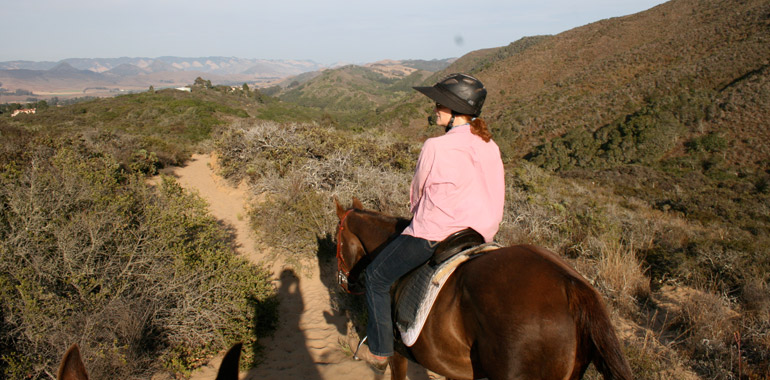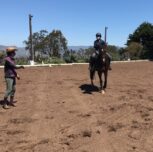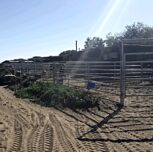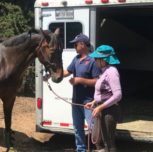I must admit that when summer rolls around where my ranch is, we are usually putting jackets on over long sleeves! Los Osos is known for “June Gloom” and cool summer days. When I leave our cool climate to clinic or compete however, I run head on into preparing for heat challenges. It is important to realize that hot weather challenges a horse’s body to remain cool. If the work-out, transportation, or time spent in the hot sun goes too long before replenishing the fluids lost from sweating, serious complications to your horse’s health may result. Heat safety while horse riding and prevention of over-heating during the summer are a must.
Tips For Heat Safety While Horse Riding
If you plan to travel for competition, for example, it is wise to supplement your horses diet with electrolytes. These additives are shown to play an important part in restoring what salts and minerals are lost when horses sweat, thereby helping maintain fluid balances, and vital body functions. Because they increase the salt in the horse’s blood, it is very important the horse has access to lots of water, and that he drinks it. If you live in hot weather, it may be beneficial to use electrolytes on an ongoing basis. A guide for this is if you work your horse hard enough to produce obvious sweating for up to an hour. In any case it is good practice to always have salt and clean water available to your horse year round.
During hotter weather conditions, it is an especially wise preventative measure to be sure your horse is in adequate physical condition for the work ahead. Whenever possible, I try to ride at cooler times of the day. Keep the riding session on the shorter side, allow for sufficient walk breaks, stay under shade when possible, and create an adequate warm-up and cool-down on both sides of the actual ride.
Hosing down with water can be helpful to cool your horse’s body temperature during the ride. This can be done periodically and adding some rubbing alcohol to the wash water can help as well. There are also some very helpful commercial products on the market now, both for horse and rider, which are very helpful in keeping the body temperature cooler. I personally use the “Cool Medic” products, such as a horse head bonnet and shoulder- back cover, and the human vests for myself. I have found them a vital asset to my performance.
Heat Safety And Transporting Your Horse
When hauling in a trailer, adequate water and ventilation are critical. It may be necessary to travel at night rather than during the heat of the day. It is possible to equip your trailer with ventilation fans or air conditioning if you frequently travel during the summer. If traveling to a competition with different weather conditions, be sure to arrive early enough to let your horse and yourself acclimate to the weather. In 2011, when I had to trailer one of my horses back to Illinois in August for the Developing Prix St. George Finals, we took all these factors into consideration. Because my horse was very sensitive to new smells and tastes, I decided to syringe his electrolytes orally to be sure he got them. I had prepared him to drink the water in the new locations by adding a little vinegar to his water while at home so he knew the taste already.
Checking Your Horse For Heat Stress
There are some simple tests you can do to check if your horse is becoming dehydrated. One is to pinch the skin near the point of the shoulder and then release it. The skin should flatten within about two to three seconds. You can also check the color of the gums by raising the upper lip. The gums should be a pink color, and not be dark or discolored. Also press on the gums with your finger above the maxillary incisors. The capillary refill should be about two to three seconds as well. Your horse should perspire when working him, and a cessation of sweat may indicate he is becoming stressed by the heat. The sweat should be clear and watery, not thick or lathery, which may indicate a greater loss of electrolytes.
Just being aware of the potential danger of heat stress, and taking simple but conscious preventative measures, you can make wiser choices and keep riding in the summer safe and fun. It is also very helpful to consult with your veterinarian of questions and concerns.








